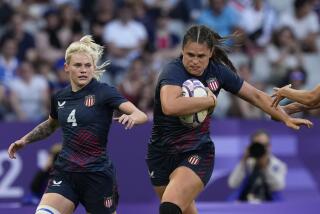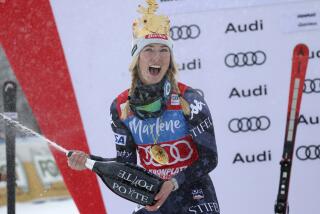Mahre Brothers Can’t Get Off the Ski Slopes, But They Are Trying
- Share via
YAKIMA, Wash. — Four years after winning gold and silver medals at the 1984 Winter Olympics and retiring shortly after, Phil and Steve Mahre are still trying to get away from the ski slopes.
But the greatest slalom racers in U.S. history know that skiing is still their meal ticket, even though they’re no longer threading gates at 80 m.p.h.
The twins, now 30, spend time on skis each year to fulfill their endorsement, personal appearance and ski camp commitments, but not for pleasure.
“I ski 40 to 50 days a year and most of it is business,” said Phil, who won the gold medal in slalom at the 1984 Sarajevo Olympics. “I wish I could take a whole year and not ski at all. But I know that will never happen.”
“I might ski 10 days a year if I had a choice,” echoed Steve, who is four minutes younger than his brother, and who finished second in the slalom at Sarajevo by about two-tenths of a second.
During their competitive prime, Steve said they skied about 250 days per year.
The Yakima residents, who grew up on the slopes of the nearby White Pass ski area, have never made a secret of their lost interest in skiing.
“I just don’t have the mental desire to do it anymore,” Phil said.
They’d rather pursue their new hobby of auto racing, or their various business interests, than strap boards to their feet, they said recently in separate interviews.
But neither has any doubt they could still perform at a world-class level.
That’s why when the U.S. Ski Team approached them last year about coming out of retirement for the 1988 Calgary Olympics, the Mahres offered to do so only if they were guaranteed $1 million in endorsements and related payments.
“We threw it out with the hope they wouldn’t meet it,” Steve said, noting the twins have lost the competitive fire for ski racing and feared tarnishing their image.
Although ski racing is an amateur sport, athletes can receive funds from sponsors through their national federations. The funds must be placed into trusts, but athletes can withdraw funds to meet “living expenses.”
In their prime, the brothers have estimated their combined earnings at about $750,000 per year.
“If I came back it would be for personal monetary gain,” Steve said.
It’s no wonder the ski team covets the Mahres. No U.S. male skier has won the World Cup since Phil claimed his third overall title in 1983. And none has won a World Championship ski race since Steve won a giant slalom in 1982, said spokeswoman Katherine Reynolds of the U.S. Ski Team.
The Mahres serve on the board of trustees of the ski team, and help with fund-raising.
The outlook for the 1988 U.S. men’s ski team is not particularly bright, Steve said.
“Realistically, I don’t feel too many (U.S.) kids can win medals this time,” Steve said, adding that a top five finish by an American male in any event would be considered good.
While the Mahres won’t be competing, they’d like to attend the Olympics as commentators for ABC Sports. So far they have been rebuffed.
“We’ve talked with ABC and its real doubtful,” said Phil.
The network is happy with long-time ski analyst Bob Beattie, said ABC spokesman Jeff Tolvin in New York.
The Mahres don’t need the money, even though their four-year-old ski apparel business, TWN (pronounced ‘twin’) Corp. lost about $300,000 last year, despite sales of $750,000, Phil said.
“It’s questionable where TWN will be one year or five years from now,” Steve said.
The brothers still earn $50,000 a year each for promotional work for K-2 Ski Corp. They also endorse other ski equipment and make personal appearances.
In addition, they run six five-day ski training seminars at the Mahre Training Center in Keystone, Colo., where people pay about $400 for instruction.
“We try to ski half a day with every student there,” Phil said.
Steve recently returned from Italy, where he did some announcing on a World Cup event for ESPN. He said he would like to pursue broadcasting further, especially if it involved sports other than skiing.
The brothers were born in Yakima, and have lived in the area most of their lives. Their father is the mountain manager at White Pass.
Phil lives in an imposing glass and wood house the twins built above the Yakima River Canyon, with his wife and two children.
Steve lives in a more modest home in a suburb just outside of town. He cares for his son, 3, and daughter, 6, on alternating weeks with his wife, Debbie, who has filed for divorce.
Both admit that their interest is skiing may be rekindled as their children take up the sport.
“More rewarding than anything is watching my kids ski,” said Phil, who has a five-year-old daughter and a three-year-old son. “I like to go out and show them turns.”
Phil won the gold the same day his son, Alexander, was born in the U.S. It was that, rather than the medal, that moved him to tears at the press conference after his performance.
A desire to be closer to family, and out of the limelight, prompted their retirement a month after the Olympics.
The Mahres, who long bristled at the hype of the Olympics compared to the lesser attention paid the World Cup races, remain unimpressed with their Olympic medals.
“The only thing the Olympic medal did that three World Cup titles didn’t do is make more people aware of me and my accomplishments,” Phil said.
Steve’s medal is currently on display at the Nordstrom department store branch in Yakima, which sells TWN apparel, Steve said. Other times he keeps it in a drawer.
But there is no doubt that the upcoming Olympics have renewed interest in the accomplishments of the Mahres.
“There are increased demands on our time and more people are getting in touch with us,” Steve said. “We were the last people to win medals in that event.”
More to Read
Go beyond the scoreboard
Get the latest on L.A.'s teams in the daily Sports Report newsletter.
You may occasionally receive promotional content from the Los Angeles Times.






